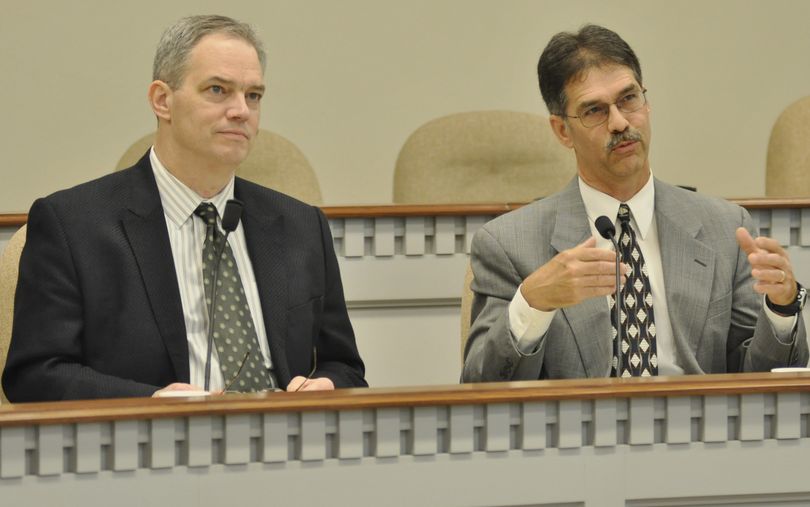Good forecast could mean Lege gets outta town

State economist Steve Lerch, right, explains figures from the latest economic forecast to Rep. Ross Hunter Tuesday.
OLYMPIA -- The state's economic outlook is improving, in part because of better home sales, and the state could have an extra $231 million in tax revenue over the next two years for its general operating budget.
That's the word from the Revenue and Forecast Council, which believes the March projections were a bit low by about $110 million for this biennium and $121 million for the 2013-15 biennium.
While a relatively small percentage of the state's operating budget, which tops $32 billion, negotiators who have been locked in budget talks for weeks predicted it will generate an agreement relatively soon and prevent a partial government shutdown in July.
"We'll get closer as a result of this," Rep. Ross Hunter, D-Medina, chairman of the House Appropriations Committee, said.
"It should break one of the final logjams," Sen. Andy Hill, R-Redmond, chairman of the Senate Ways and Means Committee, said. . .
To read the rest of this item, or to comment, CLICK HERE to continue inside the blog.
Leaders of the Senate Majority Coalition Caucus, comprised of all 23 Republicans and 2 defecting Democrats, said the extra revenue should quiet House Democrats and Gov. Jay Inslee's requests for higher taxes by closing certain tax exemptions. They say the size of the budget grew by $480 million in the last week: the $231 million from the revenue forecast, nearly $90 million the state might not have to spend because of decreased demand for certain programs, and $160 million from a change in the estate tax that passed last week.
If there's no call for taxes, they would drop their demand of "reforms for revenue" and not insist on changes to the state's workers compensation system.
"We should wrap up our business and get out of town," Senate Majority Leader Rodney Tom, D-Medina, said. "I see no reason why we shouldn't be able to come to an agreement today" on the size of the overall budget.
"We still feel very strongly about the need for reform," Sen. Mark Schoesler, R-Ritzville, said. "We're not linking the two together any more."
House Majority Leader Pat Sullivan, D-Covington, called the forecast good news that the economy is rebuilding. "But it certainly doesn't solve all our budget problems" because the state will still have to pay far more to improve education in the coming years, he said.
"So, while today's forecast may get us closer to a go-home budget, we can't pretend we've solved the long-term problem," Sullivan said.
The revenue forecast was a mixture of positive news and negative news, Steve Lerch, the state's chief economist said.
"We still continue to have the same concerns we've had for some time," Lerch said, Among them: a slowdown in China, unemployment, flat Gross Domestic Product.
Housing permits are slightly above the March projections, he said. "Houses are very affordable in historic terms."
On the plus side:
*Job growth is modest and unemployment rates are coming down "fairly slowly."
* Consumer confidence is slowly strengthening as gasoline prices bounce around and uncertainty about federal government continues. Auto sales continue up. Home sales are up almost 15 percent compared to a year ago and commercial real estate sales are strong.
* Growth rate in exports is up, but slowing down. Boeing had strong sales of airplanes in May.
* Sales tax and Business and Occupation tax receipts are growing.
* Revenue is above pre-recession levels, but they'll drop in July because a temporary surcharge on some service businesses goes away.
For the coming biennium, which starts on July 1, the state can expect to have $32.662 billion coming into its general fund.
The Legislature has spent the 105 days of the regular session, 30 days of the first special session and 7 days so far in the second special session without an agreement on that budget. Without a budget by July 1, the state would be without legal authority to spend money on some programs or pay some state workers' salaries. Last week, Inslee ordered his cabinet heads to begin preparing plans for a partial government shutdown if a budget doesn't pass.
David Schumacher, director of the Office of Financial Management, said those preparations will continue as a precaution but "I think it's unlikely there will be any shutdown in July."
